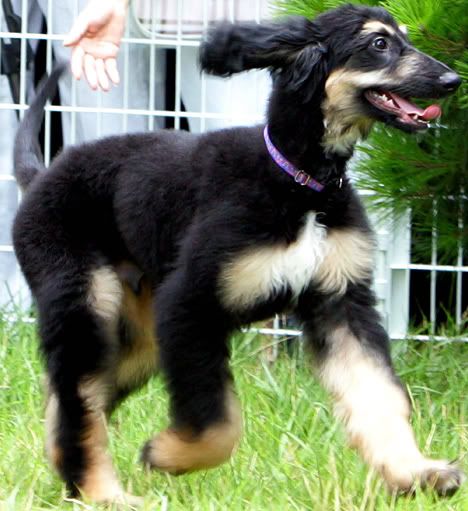
Above: Snuppy the Cloned Afghan Hound
In the mid-1990s I was an animal behavior practitioner in a progressive animal clinic in the North County area of San Diego.
The other unique associates included a natural nutritionist, two animal psychics, an animal body work therapist, a holistic veterinarian, and a cryobank specialist who had begun to collect cells for future cloning.
Today such practices are not so out of the norm but at the time we were certainly out of the box when it came to progressive animal care.
So, when the topic of cloning came to the forefront in a radio interview done by the owner—well, the broken windows and other hateful activities at the upscale clinic took us by surprise.
Today cloning discussions are no less volatile but people are more amiable to the idea that has become a reality.
Not too long ago RNL Bio, a company based at Seoul National University, made the news for recently cloning an American pit bull terrier for $50,000. The DNA of the dog was passed on to five puppies. The company is now offering cloning services globally with its estimated capacity to clone about 300 dogs per year.
The first successful dog cloning hit the news a few years ago when Snuppy, the Afghan hound was born. At the time the procedure was still new and full of difficulties.
To obtain Snuppy, over 1,000 embryos were transplanted (into over 120 bitches). Despite the volume only three of the transplants resulted in pregnancies. Not all of them were successful but it made headlines.
Differences in the reproductive cycles between cats and dogs have made it easier to clone felines whose cycles can be induced instead of waiting for the once or twice annual receptivity of the dog. The now defunct Genetic Savings and Clone was successful with cats but hit difficulties when it came to dogs.
When it comes to cloning people mistakenly think they will get the same animal back. This is not true because an exact replica is unlikely. Coats, markings, and temperament and personality will not be the same but the animal will be genetically identical.
Guidelines will have to be developed in a variety of professional animal organizations. May will want to determine whether or not an animal is cloned. Screening via DNA from both parents can be used to identify offspring versus a clone animal.
Some argue that cloning might help preserve rare breeds but the American Kennel club is currently opposed to the procedure.
Today the worry over cloned pets is minor due to the high price of producing such animals but eventually technology and demand will drive the cost factor down.
Even so, I doubt that the arguments over the procedure will be less fierce.
Do you have an opinion on cloning animals? If so, leave a comment below.


I am reseacrhing animal cloning for a college paper and the main question I have is: Would a cloned animal have the same personality? I know you said no to this, but do you mind explaining more in depth as to why a cloned animal cannot have the same personality. Also, Would re-training be required? For example if you cloned a well trained horse, would a cloned one act wild and you would have to retrain it as well? Thanks for you time
You are right I already discussed this. If you reread the post you will find that the animal is the same genetic makeup which does not mean it is the same animal with the same personality.
Twins are similar but not the same. Siblings are similar but not the same. Ditto for clones except the genetics are duplicates.
I will say that I do believe there is some confusion in the idea of cloning as replacing a pet in replica. That would be a mistake. I look at it as creating a son or daughter of that pet. The real moral question is current technical challenges, the ethics of the animals used, and the deformed experiments who will not survive. But something also occurs to me: cloning will undoubtedly be possible in a mass way 10, 15, 20 years in the future, and will likely be less invasive and unethical. Still, and this is my biggest challenge, how may I bring a life into the world resting upon the shoulders of thousands of experimental animals lives lost? Then again, will I feel that I have betrayed my beloved pet, feeling guilty every time I hug its clone, and realize that I’m trying to relive the feelings that were special and unique to the parent’s relationship? I’ve fantacized the tears that I would feel when meeting P’s clone for the first time – but could I look upon him as a true son of P, a unique act of nature, or as an attempt to replicate P? I wrestle with these things as my new yearly storage fee comes up. I believe that I will have P’s remains sent back to me to bury in a plant, and maybe I will be able to release him to eternity. Perhaps gene storage has helped through my grieving process? People who are critical of those who seek a clone, please be immeasurably kind, and do not judge. Each person’s feelings are so very very individual.
Thanks for your comment Randy. Yes, it will be interesting to see what unfolds in the future. There is a lot of misunderstanding when it comes to cloning and if the cryogenic storage helps you move forward, then that is good. Too many people want to force their wills on others and ignore the fact that each person deserves their own choices and opinions.